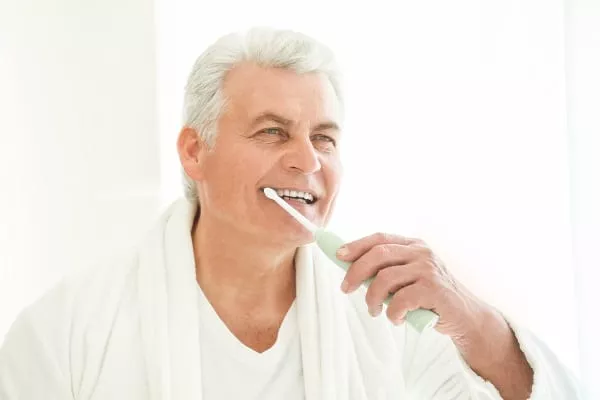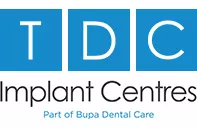We aim to provide you with information that helps you make the best treatment decisions. In this section, we provide useful articles to answer the questions we are often asked, and tell you more about the award-winning TDC team.
Caring for your Smile in a Day dental implants

Good quality, well-placed dental implants can literally be life-changing – all the problems associated with dentures or loose and missing teeth are swept away.
Your new teeth are securely fixed onto the implants (titanium screws that are inserted into your jawbone to replace your natural tooth root) so they never move.
You can bite and chew normally again, meaning that you can eat, taste and enjoy any food you want without worrying about slipping dentures or loose teeth – including crunchy apples, meat, nuts and corn on the cob.
Best of all, you can see a beautiful new smile when you look at your reflection in the mirror – you never need to feel self-conscious about your teeth again. Your self-confidence is restored.
One of the other key benefits of dental implants is that they preserve your bone and are thus a long-lasting solution – they can last a lifetime if they are well maintained.
“It’s important to understand that your new teeth need to be properly cared for to maximise their lifespan, just as you would expect to care for natural teeth,” says Total Dentalcare (TDC) Lead Dentist Dr Anthony Zybutz.
So how should I care for my dental implants?
People are often uncertain about how to care for dental implants.
At TDC we provide you with all the dental care information and advice you need to look after your new teeth, and advise the following key tips to keep your Smile in a Day implants in the best possible condition:
Maintain a really good-at home dental hygiene routine
Along with making sure your implants are placed by an experienced dental implant surgeon, making sure you follow an effective oral health care routine at home is the biggest factor in keeping them looking good and maximising their lifespan.
1. Use your electric toothbrush just as you would for natural teeth: this means for 2 minutes with the brush head half on the tooth and half on the prosthetic gum. Any toothpaste will do, but avoid overly abrasive toothpastes e.g. smoker’s toothpastes.
2. Next, replace the round brush head with the interdental brush head (we suggest Oral B, available on Amazon), and work along the natural gum line, both inside (or tongue side) and outside (lips and cheek side); try to push this bendy brush under the bridge areas.
3. Finally, at night, use your water pik to jet any debris that may have caught under the bridge areas. Remember to re-fill the reservoir (cordless water pik) three times for your upper set of teeth, and three times for your lower set of teeth.
4. Some patients can benefit from using super floss (floss with a spongy bit) especially in the easy to access areas under the back teeth.
Visit your implant dentist for regular check-ups
Once you have your permanent set of teeth and your treatment is complete, it is important to attend regular dental implant check-ups and hygiene appointments.
“At TDC, for most patients we recommend cleaning appointments every 3 to 4 months, and dental check-ups every 12 to 18 months so we can check all areas of your mouth and around the implants,” says Dr Anthony.
“It means we can monitor and maintain the health of your teeth and gums, just as we would with natural teeth.
We can advise you personally and identify any small issues before they become a serious problem. We also always complete a mouth cancer screening for total peace of mind.”
Stop smoking!
Whilst smoking doesn’t stop you from having dental implants placed, research has shown that the rate of implant failure is significantly higher for those who smoke than those who don’t. Of course, for general health reasons, everyone should attempt to stop smoking.
“At TDC we don’t judge our patients for smoking,” says Dr Anthony, “But we are honest about the implications it can have on the long-term success of their dental implant treatment.”
Nicotine constricts your blood vessels, depriving the tissue in your mouth of oxygen and nutrients. It also reduces saliva flow. All of these slow down the healing process. Smoking also lowers your immunity and ability to fight infection.
“It never ceases to amaze me as to how many patients use having dental implant therapy as the reason to stop smoking.
The majority realise that smoking has heavily contributed to their tooth loss and they just don’t want to go back there.”
So, if you are a smoker and are thinking about having dental implants – or have had implants placed – giving up smoking is good for both your general health and helping to make sure your implants last.
What can I eat with my new teeth?
Advanced, same-day dental implants such as Smile in a Day are known as “immediate loading”.
This means that temporary teeth are secured onto your implants on the day of surgery, so you do not have any gaps or have to wear a false teeth during the osseointegration phase (the period whilst your bone integrates with your dental implants).
These temporary teeth remain in place night and day until they are replaced, about three months later, for your final, permanent set of teeth with no more surgery and no more injections.
• Eating with your first set of fixed teeth
These are the new teeth that you get on the same day that your dental implants are placed.
They are made from a composite material to appear just like real teeth – however, we can design them any way you want, with smiles ranging from Simon Cowell white to completely natural.
Most patients choose something in between; a natural-looking, clean white smile.
Unlike false teeth that you often wear with traditional implant methods, they stay secured in place by the implants, 24 hours a day, for about 8-12 weeks whilst your bone integrates or heals with your implants.
Whilst you could easily bite into an apple on the actual day of dental implant surgery, we advise you to take things slowly when you are wearing your temporary set – you will be getting used to the feeling of having new teeth, and may feel nervous about chewing and biting and could easily bite your tongue or lips.
So, we recommend that you build up gradually and eat only foods that you can cut with a fork.
• Eating with your final, permanent fixed teeth
Your final permanent teeth are placed at a non-surgical appointment about 3 months after surgery.
These new teeth are also crafted from a high-quality composite material that is re-inforced with a titanium bar to combine optimum strength, durability and shock absorbency.
We start by taking new impressions to ensure that your new set fits to any gum shrinkage that has occurred. It then takes a few more appointments to check and let you approve your final smile before your final teeth are placed.
We make sure that the fit, function and appearance of your teeth are absolutely right.
Now you can eat any food you want – just as you would with natural teeth. You can bite and chew normally, and without worry. You can bite into those crisp apples, crunchy baguettes and mouthwatering steaks!
If you previously wore a denture, you’ll find that you can taste your food again as there is no bulky strap covering your palate.
Can my new teeth break?
At TDC we always use the highest quality materials for your treatment, but, just like natural teeth, the teeth on your implant bridge will be subject to wear and tear from daily grinding and chewing of normal foods.
This means that they can occasionally chip or break, but they can usually be easily and quickly repaired or replaced. This will not affect your implants which will still securely hold your new teeth in place.
Of course, do remember that your new teeth are not bionic, so just treat them like natural teeth.
We advise all our patients to use a night guard to protect your new teeth from the effects of clenching and grinding while you sleep.
What can happen if I don’t look after my new teeth on dental implants?
If natural teeth are neglected they can develop a covering of deposits. If left untreated, this can lead to gum tissue infection. This is just the same for dental implant teeth.
And, just as natural teeth can develop gum disease leading to the loss of the supporting bone over time, dental implants can develop a similar pattern of gradual bone loss if they are not kept clean with a good oral hygiene routine.
In severe cases this can lead to implant failure. So, it is important to understand that you need to commit to looking after your new teeth if you want your investment to last and to enjoy all the benefits of your restored teeth.
Caring for your new teeth is a team effort
At TDC, our dental teams have over 25 years’ experience placing dental implants, are leaders in the same-day dental implant technique, and you can be assured that we use only the best quality dental implants.
We know these factors deliver the best long-term results for our patients and have won multiple awards for our patient care and support – before, during and after implant treatment.
“Please remember,” says Dr Anthony, “That once your Smile in a Day dental implant treatment is complete, it is your responsibility to maintain your implant teeth.
We will work with you, but it is the quality of your personal oral hygiene routine and willingness to come for dentist and regular dental hygienist maintenance reviews that influences how long they last.
Continued care of your new implant teeth will assure their continuing health, aesthetics and function, just as with natural teeth.
Our patients always say that the results are life-changing – so taking care of your investment is a small price to pay for your beautiful new smile!”
Why not get in touch?
TDC have two UK-based dedicated implant centres in London Harley Street and Folkestone, where we offer our award-winning Smile in a Day same-day dental implant procedure.
For more information, including your suitability for Smile in a Day dental implant treatment and cost, book your free, no-obligation consultation* or call our highly trained Implant Patient Advisors on 020 3553 6415
